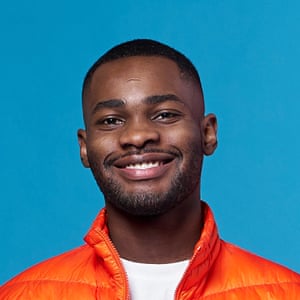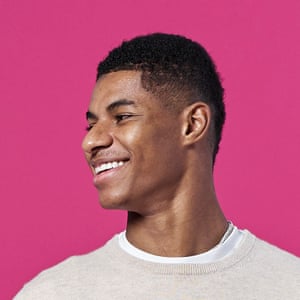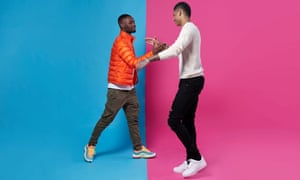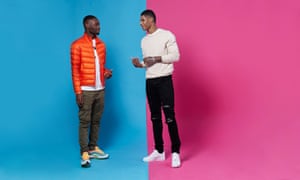[ad_1]
In a hard-to-find studio in north London, there is a small encounter between two big names. Dave arrives first. The south London rapper, 21, moved into the mainstream this year, winning the Mercury prize with his first album, Psychodrama, and making an explosive acting debut in Netflix’s Top Boy, as the thoroughly terrifying Modie. His sellout tour and Glastonbury show made news, too: remember the viral footage of the bucket-hatted kid who joined him on stage to rap on Thiago Silva (11m views)? Dave is cool and quiet, shaking everyone’s hand before taking himself off with his phone until Marcus Rashford appears.
Rashford is a little late. Understandable, perhaps: it was Manchester United’s Christmas party last night, and he’s recently played vital, hard-fought games against Tottenham and City. But, despite being only 22, United and England’s young forward isn’t known for partying, and when he arrives he’s fresh and relaxed. Slighter than you might expect, and taller, he’s not flash, though his jeans have diamante sprinkled across the rips. He and Dave are months apart in age, but Rashford has a younger, less wary air. When he smiles, he looks like a kid.
Dave is a huge United fan and Rashford likes his rap and grime, but at first both stick to their small entourages, check their clothes, worry about the photos. There is discussion of trainers: both have brought a brand new pair to wear. Dave’s are orange Air Max; Rashford’s classic white Air Force 1s. They are both naturally shy, you realise, and deliberately low-key in the manner of those for whom fame is a side product of their job. Why attract attention when you get so much in everyday life?
Rashford is coming up to the toughest part of his season. “December is hard,” he says, calmly. “We’ve got two matches this week.” Dave is not in work mode. Supposedly he went straight into the studio after winning his Mercury prize, but at the moment he’s happy to be out and about. And very happy to talk football. “It’s what I do my entire life when I’m not doing music,” he says. “If I’m in a hotel room in Sweden, or on a plane to Vancouver, I’m watching football. I’ll try to talk about other stuff, too, but football is a lifestyle.”
Marcus Rashford What year were you born – 97?
Dave 98. What were the big tunes at school that you can remember?
MR Everyone was into Drake, Tinchy Stryder, Kano.
D But Kano felt like he was more primary school than secondary school. I feel like 13 and 14 was Krept and Konan, Yungen and Cashtastic… I remember the dances, too. Do you dance?
MR Nah, I don’t dance. When I was younger, I was either playing football, or when I was listening to music I was always on my bike. On my earphones.
D I don’t dance, either. I remember people jerking and doing the Dougie – that was some American dance, the Dougie. Moving like you have a migraine. Your hands up here by your head. That was a real thing at school.
MR There were a lot of underground artists I listened to. One of my brothers has a friend called Meena and if he was at my house seeing my brother, I was playing Fifa and they’d just rap all day. So I was around music.
When did you start rapping?
D When I was 14. It didn’t go well. I remember putting out a video and it got 41 views in the first day. And I’m going into class, and I’m thinking, “Rah, this is mad, I’m fucked, I only got 41 views.” But the positive of it was, “All right, I only got 41 views, so no one’s seen it.” Unfortunately, 30 of the 41 views must’ve been my classmates. So I could not live it down.
There was a sort of chain in school. I wasn’t, like, mad at the top, but I wasn’t right at the bottom, either. I was a laughing stock. Walking past girls, they’re whispering, they’re laughing. You’re thinking, “Nah, I want to disappear, I never want to feel like this again.” I remember thinking, “Yeah, I’m retiring.”
Remember Kaylum Dennis [the award-winning music video director]?
MR Yeah.


D Kaylum filmed it and I remember the video cost £40. That was everything I had. At 14, to amass £40! I was getting £2 a day for dinner money. The pasta in school was £1.60. I used to spend 50p to buy Skittles every morning, because I never had breakfast. So I’d always be 10p short for the pasta. Anyway, I remember thinking, “All right, cool, I’m going to miss dinners, put everything into this video”, and then that happened. So I retired.
MR I’ve never picked up a mic – football was the focus. But the link between music and football is interesting for me, the two go hand in hand. We’d never play football without one of my friends bringing a speaker.
Your upbringing definitely affects what music you like. A lot of people I know can relate to musicians because when they were younger they had nothing, same as me.
D Music and football are two industries where black people excel, because talent is undeniable. You can’t deny an amazing voice. You can’t deny amazing athletic prowess. Physically, it’s evident. But in other industries, circumstance is more of a thing. Where you grew up, where you studied, the opportunities you got, where you’ve done work experience. When you’re talking about sport and entertainment at the highest level, you’re talking about an industry that grosses billions every year on a very select few people’s talent.
With music there are a lot of people who have lyrics, who are doing their thing, but the percentage at the top tier is so, so, so few. What certain people can do with a football, no one else in the world could do. If I tried now and dedicated my life to getting a master’s or something academically, it could take me 10, 15 years. I could do it. But only the tiniest per cent, like 0.0001% of people, could do something as simple as sprinting down a pitch and maintaining the composure to bring the ball down. The margins! If you don’t put enough length on a pass, that’s the difference between three points, one point – that’s your season. Certain things are just bonkers.
MR For me, football brings people together. Where I grew up, I know the whole community from playing football in the park. I have the same friends from when I was six, seven years old. If some of my friends weren’t at the park, then they would have probably been getting into trouble. Football definitely helps communities, and you want to spread that message. Because I think sometimes people get caught up in, “Oh, he’s made it, he didn’t make it.” I don’t like to discuss that.
D How do you feel when you walk on to the pitch?
MR It’s about expressing myself, doing things that I do naturally, that I might not be able to [do anywhere else] any more. If I wanted to go to the park now and play football, I’m going to be there the whole day talking to people. But when you step over the white lines to play a match, you’re free to do what you love. What you know.
D Can you hear everything and everyone around you, or is it on mute?
MR At first, when I played, it was mad. I remember looking at a section of the crowd and I must have seen about 10 or 15 people I knew. That’s when it hit me, in the first game, and I was like, “Wow, this is a bit weird – he lives there, he lives there, my mum lives five minutes away from him.” These things are going through my head. I needed to block it out and just focus on the game, and that’s what I did. And in that first game, honestly, I didn’t feel any fatigue, I was just running about on the pitch. When you lose yourself in the game, you always play your best football. You can hear the noise, you can feel the energy, but… Something’s there, but it’s not there. That’s the best way to approach it.
D Is it different at home games?
MR At home, if it’s positive energy, it drives you through your games. Your legs might not be there, but those games can be your best games, and it’s just because of the fans. If you played with no fans, there’s no way you’d be able to play 55, 60 games in a season. It’s not possible.
D When I’m performing, the crowd just disappears, it’s like everyone merges – one big person. You just say the words and people will say the words back to you. And it’s just so rehearsed. I have a lot of songs I couldn’t forget the words if I tried. So you get in there, you lose yourself and it’s all good.

MR So you don’t feel pressure?
D Where I feel pressure in performance is when I’m being filmed and I’ve got to play and rap – I know if I drop a chord, I’ve dropped a song. If I’m playing a song on piano, if I miss a note I have to go back, because certain scales only make sense when you have the note before. So I have to bring the lyrics back. So everyone knows, yeah, he’s messed up.
I did NPR’s Tiny Desk, this performance in America to a few people, and it’s the most nervous I’ve felt, because I can see the people who are judging me. When things are up close and personal, then you start to feel the pressure.
MR No teammates to help.
D Yeah. But I wouldn’t have it any other way. Because I know, if it’s a great show, it’s on me.
How are you with your social media?
MR There’s too much negativity. For me, you should only use your social channels to better the things around you. The rest of the time, I don’t look at it. If you go on Twitter, you’re going to see something bad, something good. You just don’t really need it.
D I have to use it, because everything that I do is through social media. If I upload a video, I have to tell you: this video is up. I’m performing on stage here, blah blah blah. Certain times I’ll come off.
I remember there was a period where I woke up and I saw something negative about myself on my social media every day for 91 days. And it doesn’t have to be mad negative – the smallest thing can ever so slightly change your day. But once you start to believe in yourself, you can start to tune everything out. Things affect you less. I’m sure it’s the same with footballers. I just know that, in the industry I’m in, I’m a trier. There’s people in the world that try, and there’s the people in the world that talk about the people that try.
[The conversation moves on to fame, and when each of them realised they had it.]
MR Everything changed after the Arsenal game [Rashford scored twice against them in his first Premier League match in 2016]. Me and my friends used to always go to this thing called Soccer Dome to play five-a-side, and to get to it, you have to go through the Trafford Centre. I was just going to do that, and we were stuck for an hour, me and my friends, 18-year-old kids and just swarms of people. Now, I just don’t put myself in that situation. For example, say I need to go and get milk, my friend will have to go for me. If I go to the shop, a two-minute job can turn into 20 minutes. It’s weird. But it’s part and parcel of it, and it helps you grow up. You have to grow up fast.
D Yeah, fast. For me, I think it was after Drake remixed my track Wanna Know. Though people still don’t know my face. You can’t watch football without seeing someone, but you can listen to music without seeing someone. I think Top Boy really changed that. When I was on tour in America, people would say, “Oh, you’re that actor!” Those two moments I felt a massive change.
It’s funny, though, what you said about daily activities, how long they can become. Those are things I would still try to do. My manager’s always saying to me, “Why are you in Selfridges all the time?” I don’t even like shopping. But it’s the transaction of getting out of my car, walking and seeing people I don’t know. I think it’s important, even if it does take a long time, and even if you do have to smile and take a picture in this weird, awkward place, it’s important.
I try to be outside often. When there were hard times and things were dark, when there were a lot of people I’d fallen out with, I was out every day, feeling the love, and sometimes the hate. When I walk around in LA, I’m less than nothing, and that is an invaluable feeling. It reminds you of the scale of what it is you’re trying to do.
MR Manchester’s very, very small. I have quite a big family. I have two brothers, two sisters. So more often than not, somebody I’m speaking to knows my mum, or my nana, or my brother, or my brother’s friend, so everyone’s connected. Everyone’s family. But it’s the only place I can feel normal. If I didn’t go back to where I grew up and do normal stuff, see the same guy that used to serve me sweets when I was a kid, go and see my friend’s mum and dad, if I didn’t do those things, I’d be sat in my house.
[The conversation turns to the difference between a hobby and a talent.]
MR I think there’s a difference. It’s difficult, but you have to find what it is you’re talented at. I like to play basketball and stuff like that, but I’m not talented – it’s just a hobby. Do your hobby, enjoy it – but put your hard work and time into your talent.
D I agree. I’ve played football my entire life, and I’m not a bad player, but it’s not moving me and my mum out of Streatham in this lifetime. But there was a point where Juss, who’s always with me and raps, and a few friends turned around and said: rap is something you’re good at. My friends helped me find that. But you gotta work mad hard at it.
I remember being in college and girls would say: “Oh, he’s cool, but he doesn’t make the music that I would listen to, you wouldn’t hear him in a club.” It’s not my strongest point, singing or melody or rapping upbeat, uptempo, I’m not some crazy, hype, off-the-wall, flashy type of guy. But I learned quickly that collaboration and putting yourself out of your comfort zone, that’s the stuff that takes you further. Like going on Headie One’s track, or J Hus. You have to really push yourself.
MR Yes.

D I rate you so highly, not just in terms of football, but because I can see you take it seriously. I can look to you and say, “Wow, this is someone who’s got an opportunity and he’s running with it. He’s not coasting, he’s really going hard.” I love footballers – I see them out at a show or on holiday. But Marcus, I don’t see you anywhere. And that’s in itself a way of life.
MR Well, as a player, you have to take yourself out of the emotion. It’s natural, if you’re a fan: if the team wins, they must have done well; if they lose, they’ve done something wrong. But once you get caught up in that, as a player, you’re finished. It’s too up-and-down. You have to have a middle. If you win, it doesn’t mean you go crazy until the next game. If you lose, it doesn’t mean you sit moping. You have to find a balance, and you always go back to what you know.
D So you don’t go mad when you lose?
MR In the past, when we lost games and other players were just getting on with their day, I couldn’t get my head around it. Some people don’t have that connection I have with the club. That’s fine, they still give 100%. But it’s different for me. I’m a fan, I went to matches. And then probably eight months ago, things started to click. I’d got stuck in that up-and-down phase for too long. And it’s no good, cos you’re going to training the next day and if you’re still thinking about the day before, you can’t do your best. The games are a chance to showcase it, but the development’s done on the training pitch.
[The conversation turns to last week’s election.]
D Yeah, I’m going to vote.
MR Yeah, 100%. Which way? Well, if I can see the campaign’s vision – not what they want to achieve next year, but what they plan to achieve in the long term, then for me, that’s what I invest in.
D When I look at politics, I think that everything is all just words. People say, “Oh, the problem that you have in your life is because of this person, so we’re going to take this person away, and your problem’s going to go.” It’s about division, coming up to an election. And I think, as a person, what type of person could I sit in a room with? Ninety-nine per cent of politicians I probably couldn’t sit in a room with. If I feel like there’s someone I can relate to, then that’s the person I’m going to side with.
Over the last three years, I feel like evil had a chance for the first time, overtly, not just in this country, but worldwide. People voted for some really dark, crazy stuff. So this might just be the world we live in. All you can do is try to make the world a better place.
This might sound random, but seeing Cristiano Ronaldo when I was young, that did a lot for me. I used to watch Ronaldo videos every night before I went to sleep. Skills, compilations, shots, left-foot goals, all of this stuff. My life for a long time, even though it was nothing to do with football, was based around him. You can have that much impact, on someone who doesn’t even play sports.
MR I’m sort of the same but with music: I need people to give me messages. There’s only certain people I can listen to leading up to games. I can’t listen to hype music because if I go on to the pitch pumped up with raw emotion, I’m going to get a red card. I listen to the same group of people. You, Stormzy. People who are spreading messages with the words.
On the speaker, in the changing room, before a game, it’s pure hype music playing. I just sit down with my headphones. I need to be clear-minded on the pitch, because as a forward player you might not see the ball the whole game, just that one time. And the game could be 0-0. Now imagine it’s the Champions League final or the World Cup final…
D Is it more pressure being a striker than a midfielder?
MR You need a different mentality. I made my debut at 18. The beginning of that season was my first year as a striker, ever in my life. Before that I couldn’t understand how somebody can enjoy a game of football without touching a ball. Where you could have one chance and that’s it. I’ve always been a person who needs the ball – I need to express myself and make things happen.
Then all of a sudden, a coach I liked changed my mindset. Then six months later, I made my debut with the first team. The bit I needed to work on was switching the mindset. That’s what I’ve improved on a lot, but I’m still so far off where I can be. Everyone can say I scored a few goals and I’m in good form – but it’s nothing to what I can achieve.
D This new generation of footballers, I don’t think it’s ever been this expressive. The kids – I saw flair in everyone. So much competition, so much talent, and they’re all from similar age groups. This is an amazing time to be an English footballer.
MR The first time I was ever nervous was England under-16s against Ireland away. I was taking kick-off and my knee was shaking, and this had never happened before. I didn’t play as well as I could have. Since then, the word pressure has changed for me. I see it as an opportunity. At the end of the day, if you take a penalty, the keeper can save it. I could have a perfect penalty, and the keeper could just save it: it’s out of my control. In football you can’t always control the outcome or results – it’s a team sport, and anything can happen at any moment.
Why this generation is good is because that’s what everyone’s mindset is like. There are so many young players nobody knows right now, ready to come on to the scene. I’m trying to get them to understand how talented they are. Then if you work hard at it, don’t put a limit on how good you can become. Because England can definitely win something. We already know that, on our day, we can beat any team in the world – but we want to get to the level of what Germany was in 2014, and Spain for many years – that consistency. If we don’t win something with England, at the end of my career, I’d feel like something went wrong somewhere.
• If you would like your comment on this piece to be considered for Weekend magazine’s letters page, please email weekend@theguardian.com, including your name and address (not for publication).
[ad_2]
Source link
